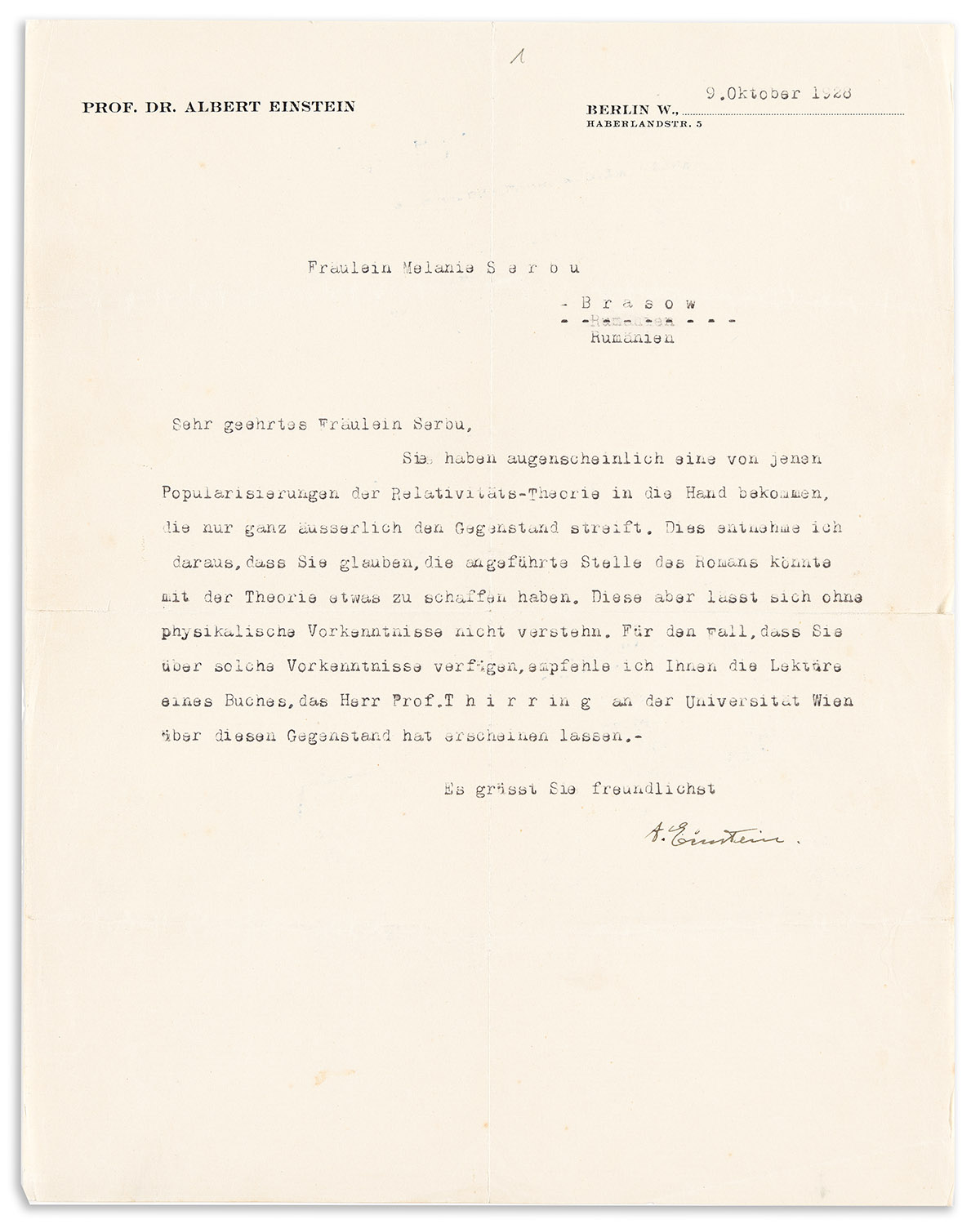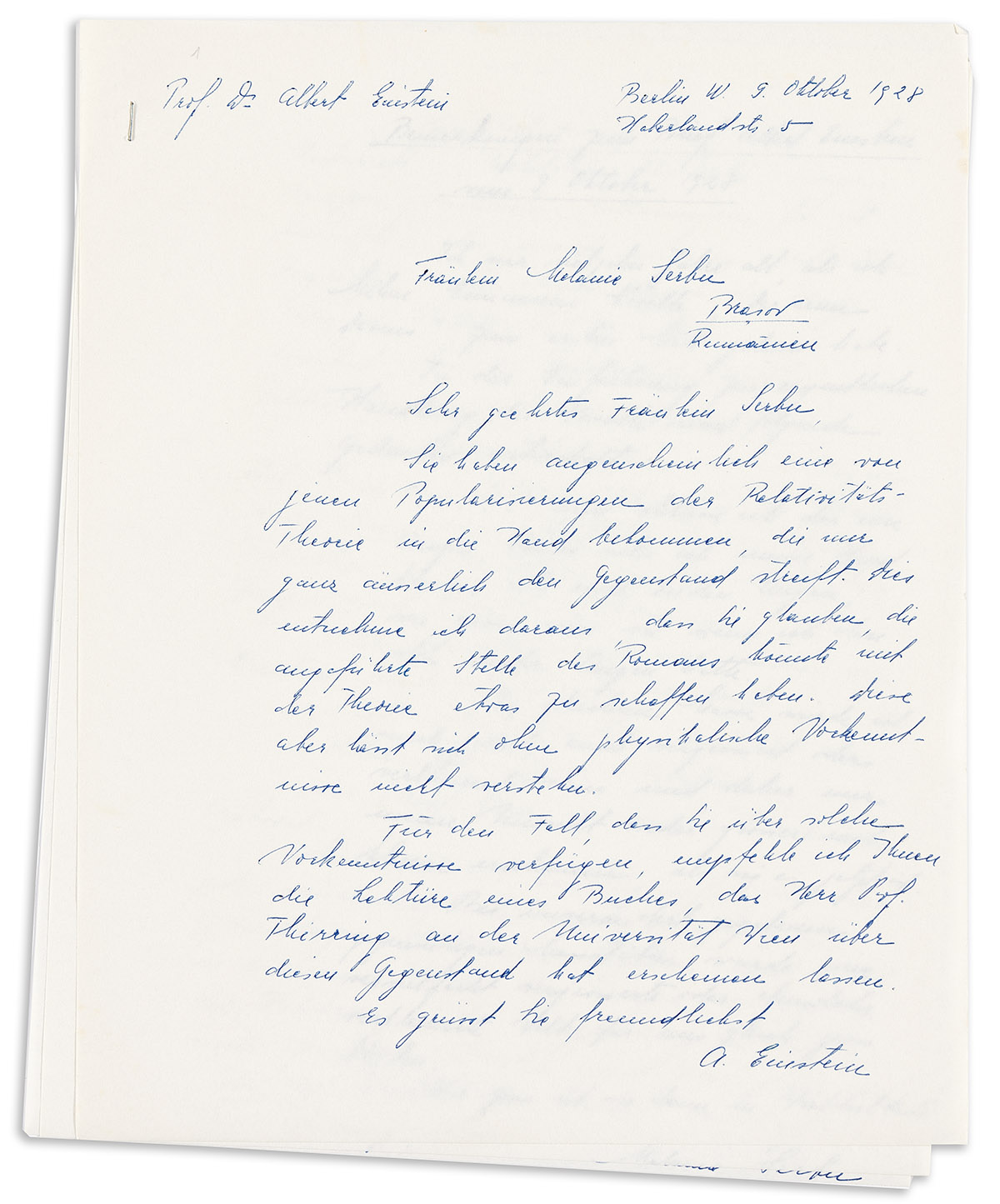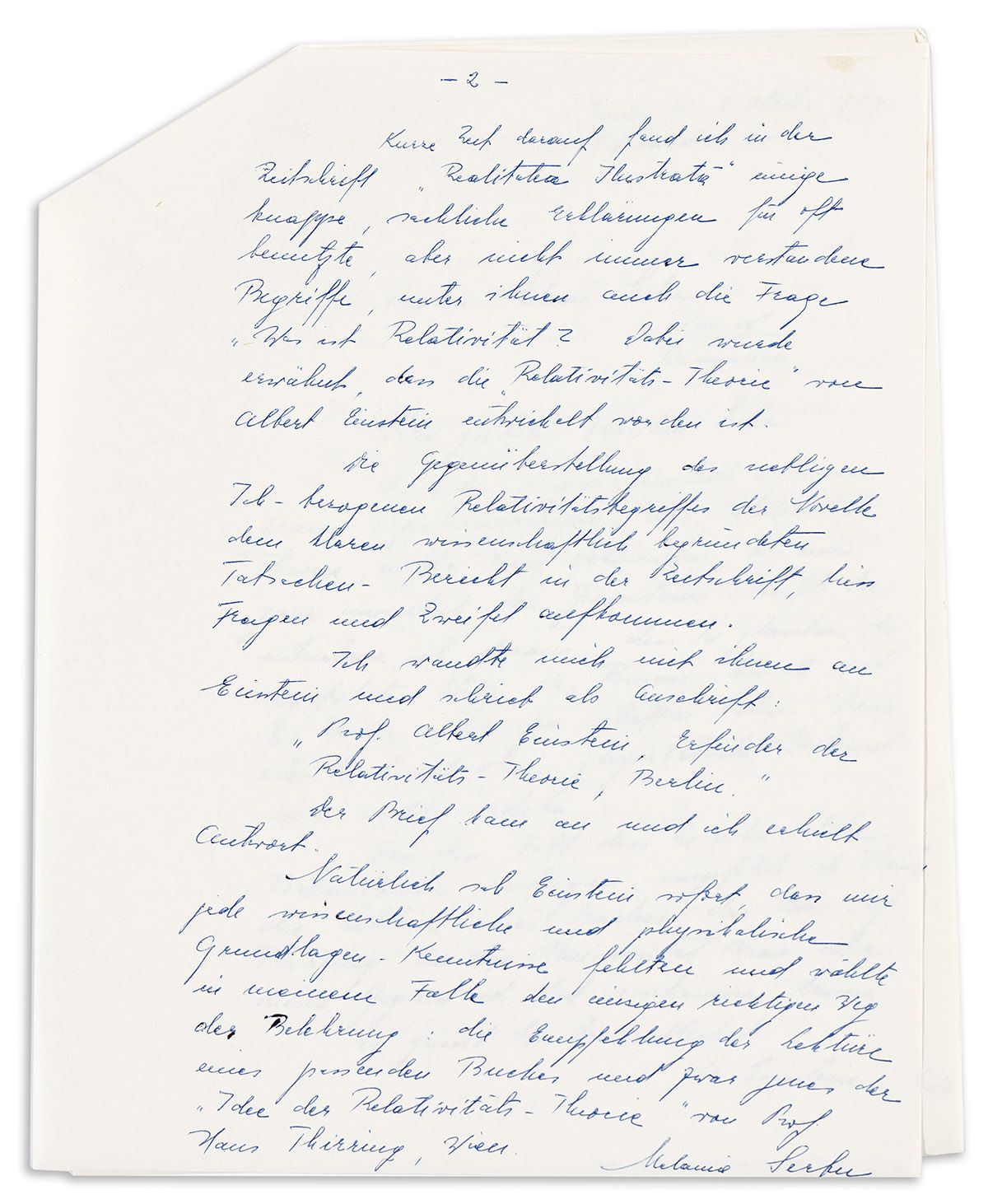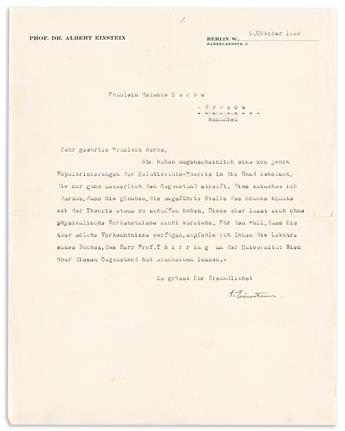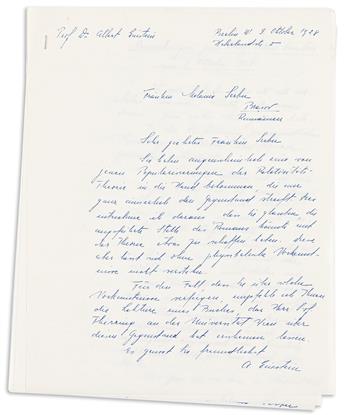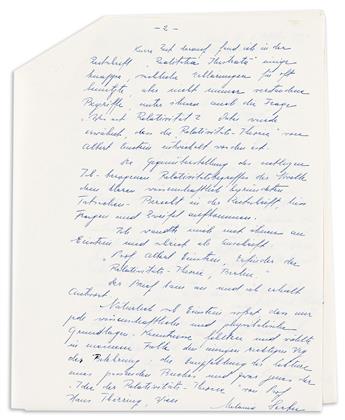Sale 2650 - Lot 64
Price Realized: $ 90,000
Price Realized: $ 112,500
?Final Price Realized includes Buyer’s Premium added to Hammer Price
Estimate: $ 100,000 - $ 200,000
LETTERS TO ASPIRING FEMALE PHYSICIST SPANNING TWO DECADES (SCIENTISTS.) EINSTEIN, ALBERT. Archive of 19 letters, each Signed, "A. Einstein," to aspiring Romanian physicist Melanie Serbu, in German, including two ALsS and 17 TLsS, expressing surprise at her gifted insight into natural science, recommending books to advance her independent study in physics and mathematics, expressing amazement that she recognized the importance of a unified theory of the natural forces, reporting that he has written to a friend who will help instruct her at a university in Prague, advising her not to marry a gentile partly because of increasing anti-Semitism, discouraging her from moving to America, discussing his understanding of liquids as solid bodies and the possibility of using the idea as her dissertation topic, expressing concern at her contracting tuberculosis and referring her to a friend in Switzerland for treatment, and advising her not to be upset that she ended up teaching rather than conducting research. Together 22 pages, 4to or oblong 12mo, most on personal stationery; generally good condition, 9 January 1929 letter with chipping along right edge and complete separations at folds repaired verso with cello tape. Vp, 1928-48
Additional Details
9 October 1928: "You have evidently got hold of one of those popularizations of the theory of relativity which only superficially touches on the subject. . . . However, this cannot be understood without prior knowledge of physics. If you have such prior knowledge, I recommend reading a book on this subject that Prof. Thirring has published at the University of Vienna."
9 January 1929: "Your extraordinarily intelligent and sympathetic letter gave me great pleasure. It is very rare that a person with so little prior education has so much understanding for the fundamental problem of physical science. . . . I was extraordinarily surprised that you immediately saw the point where the next progress must begin, namely the unity of the natural forces. I've been working on this problem for 13 years and I think I've found the solution right now.
"If your heart is set on studying mathematics, I would try to pave the way for you to do so. . . ."
26 January 1929: "I see from your letter that you really have a fervent interest in the study. . . . I will send you books that I think are well suited for self-study. . . . The main thing: proceed very slowly and never rush. There must always be a feeling that it is a matter of real pleasure. If this feeling goes away, then stop."
23 January 1935: "I think . . . you could study at the Germany university in Prague. The theoretical physicist there, Professor Philipp Frank, is a friend of mine and a very benevolent man. . . . I am convinced that this would be the right thing for you, both from a scientific and a practical point of view."
7 May 1936, ALS: "Frank writes appreciatively about your great zeal . . . .
"Penetrating deeply into natural law is so difficult that one generation cannot accomplish much. But you don't realize this until you've bothered with it long enough . . . ."
7 May 1937: ". . . I was very happy about . . . your successful exams. With regard to the marriage proposal from the . . . private lecturer you named, I cannot allow myself to judge. In and of itself, I believe that it is better for a woman to be married. If the man is not a Jew, marriage seems risky, especially under today's conditions . . . .
"Your idea of coming here doesn't seem to me to be advisable, especially since the mentality of the Prague area is probably much closer to you than the local people. It also has fewer difficulties from a financial point of view, and the prospect of finding a job here is not particularly good, even for real Americans. Even if you were here, you would get very little from me, because I don't teach and my time and energy is taken up to the last. . . .
"I am very happy that you are developing so well in Prague and that your tireless efforts have enabled you to overcome the really big obstacles presented by the unfamiliar environment and a disorderly and inadequate education. . . ."
25 May 1937, ALS: "I think the basic idea is partly correct. But . . . he starts from an incorrect conception of the solid body. Namely, if you deform such a thing, then the elastic stress-forces disappear more or less quickly with a given deformation. If the deformation forces are constant, a more or less pronounced flow occurs, independent of this instantaneous deformation process. The body bends very slowly. Think solid pitch or wax, but also lead.
"In the face of sufficiently rapid processes, the thing behaves similarly to an ideal, i.e. non-flowing, but only elastically solid body. With very slowly changing loads, however, the flow comes to the fore. . . .
"The conception of liquids as easily flowing solid bodies would then lead to the expectation that there would be transverse waves of very high frequency in liquids . . . ."
8 September 1937: ". . . [I]t is not clear from your communications whether you have . . . understood my letter on the uniform treatment of the mechanics of the solid and liquid state. . . .
"It is undoubtedly an interesting area for a dissertation, even if the ideas involved were not in principle new."
30 January 1940: ". . . I think it's stupid and unworthy to think about priority rights. I've never wasted a line or an hour on anything like this. Thank God that at least the truth is common property and not a bargaining chip."
9 April 1946: "It gives me great pleasure to hear from you that you have weathered the terrible peril of these years . . . . I hope that you can find a satisfying job as a teacher in your home country . . . . I'm doing satisfactorily myself and I'm deep in my work."
21 April 1948: ". . . I am pleased that you are engaged as a teacher. You don't have to be sad about not being able to work in your . . . subject. Teaching is always satisfying when you have an interest in young people. I would have liked to do it when I was young, but couldn't find a job."
Only one of the present letters has been published in its entirety, the one dated January 26, 1929: The Collected Papers of Albert Einstein, Volume 16, ed. Buchwald (Princeton University Press, 2021), No. 382. Other letters are summarized in the Calendar of Abstracts of that work: Nos. 680, 819, and 908.
Reproductions of all the letters are housed at the Leo Baeck Institute (Albert Einstein Collection, AR 136 / MF 549), and the Helvetic Archives at the Swiss National Library (Max Flückiger Collection, SLA-Einstein-SMF-1-1-006). Included among the letters housed at these institutions are copies of two items from Einstein to Serbu whose originals are lacking from the present archive: a letter dated August 10, 1938, in which Einstein mistakenly identifies Nicolae Malaxa as Jewish, and an original poem inscribed to Serbu on February 20, 1939, beginning "Ach, es ist gar sehr riskant / wagt man was als Dilettant."
With--Melanie Serbu. Group of 50 items which she intended to be used as source material in the publication of a memoir about her correspondence with Einstein, in German: 24 AMsS, each containing both a transcription of a letter to her--almost all from Einstein--and her later reflections on the letter; 26 typescripts, unsigned, each a transcription of one of above manuscripts plus two others. Each 4to, written on rectos of two or more sheets stapled at upper left, typescripts on onionskin paper. [Haifa, 1970s] • Two original letters to Serbu, in German: ALS by Einstein's friend Paul Habicht, explaining how he came to know Einstein; TLS by Serbu's instructor Philipp Frank, mentioning Einstein's involvement in political negotiations meant to redirect nuclear research toward peaceful ends. Together 7 pages, 8vo or 4to. Lugano, 26 October 1943; Cambridge, 20 July 1947.
9 January 1929: "Your extraordinarily intelligent and sympathetic letter gave me great pleasure. It is very rare that a person with so little prior education has so much understanding for the fundamental problem of physical science. . . . I was extraordinarily surprised that you immediately saw the point where the next progress must begin, namely the unity of the natural forces. I've been working on this problem for 13 years and I think I've found the solution right now.
"If your heart is set on studying mathematics, I would try to pave the way for you to do so. . . ."
26 January 1929: "I see from your letter that you really have a fervent interest in the study. . . . I will send you books that I think are well suited for self-study. . . . The main thing: proceed very slowly and never rush. There must always be a feeling that it is a matter of real pleasure. If this feeling goes away, then stop."
23 January 1935: "I think . . . you could study at the Germany university in Prague. The theoretical physicist there, Professor Philipp Frank, is a friend of mine and a very benevolent man. . . . I am convinced that this would be the right thing for you, both from a scientific and a practical point of view."
7 May 1936, ALS: "Frank writes appreciatively about your great zeal . . . .
"Penetrating deeply into natural law is so difficult that one generation cannot accomplish much. But you don't realize this until you've bothered with it long enough . . . ."
7 May 1937: ". . . I was very happy about . . . your successful exams. With regard to the marriage proposal from the . . . private lecturer you named, I cannot allow myself to judge. In and of itself, I believe that it is better for a woman to be married. If the man is not a Jew, marriage seems risky, especially under today's conditions . . . .
"Your idea of coming here doesn't seem to me to be advisable, especially since the mentality of the Prague area is probably much closer to you than the local people. It also has fewer difficulties from a financial point of view, and the prospect of finding a job here is not particularly good, even for real Americans. Even if you were here, you would get very little from me, because I don't teach and my time and energy is taken up to the last. . . .
"I am very happy that you are developing so well in Prague and that your tireless efforts have enabled you to overcome the really big obstacles presented by the unfamiliar environment and a disorderly and inadequate education. . . ."
25 May 1937, ALS: "I think the basic idea is partly correct. But . . . he starts from an incorrect conception of the solid body. Namely, if you deform such a thing, then the elastic stress-forces disappear more or less quickly with a given deformation. If the deformation forces are constant, a more or less pronounced flow occurs, independent of this instantaneous deformation process. The body bends very slowly. Think solid pitch or wax, but also lead.
"In the face of sufficiently rapid processes, the thing behaves similarly to an ideal, i.e. non-flowing, but only elastically solid body. With very slowly changing loads, however, the flow comes to the fore. . . .
"The conception of liquids as easily flowing solid bodies would then lead to the expectation that there would be transverse waves of very high frequency in liquids . . . ."
8 September 1937: ". . . [I]t is not clear from your communications whether you have . . . understood my letter on the uniform treatment of the mechanics of the solid and liquid state. . . .
"It is undoubtedly an interesting area for a dissertation, even if the ideas involved were not in principle new."
30 January 1940: ". . . I think it's stupid and unworthy to think about priority rights. I've never wasted a line or an hour on anything like this. Thank God that at least the truth is common property and not a bargaining chip."
9 April 1946: "It gives me great pleasure to hear from you that you have weathered the terrible peril of these years . . . . I hope that you can find a satisfying job as a teacher in your home country . . . . I'm doing satisfactorily myself and I'm deep in my work."
21 April 1948: ". . . I am pleased that you are engaged as a teacher. You don't have to be sad about not being able to work in your . . . subject. Teaching is always satisfying when you have an interest in young people. I would have liked to do it when I was young, but couldn't find a job."
Only one of the present letters has been published in its entirety, the one dated January 26, 1929: The Collected Papers of Albert Einstein, Volume 16, ed. Buchwald (Princeton University Press, 2021), No. 382. Other letters are summarized in the Calendar of Abstracts of that work: Nos. 680, 819, and 908.
Reproductions of all the letters are housed at the Leo Baeck Institute (Albert Einstein Collection, AR 136 / MF 549), and the Helvetic Archives at the Swiss National Library (Max Flückiger Collection, SLA-Einstein-SMF-1-1-006). Included among the letters housed at these institutions are copies of two items from Einstein to Serbu whose originals are lacking from the present archive: a letter dated August 10, 1938, in which Einstein mistakenly identifies Nicolae Malaxa as Jewish, and an original poem inscribed to Serbu on February 20, 1939, beginning "Ach, es ist gar sehr riskant / wagt man was als Dilettant."
With--Melanie Serbu. Group of 50 items which she intended to be used as source material in the publication of a memoir about her correspondence with Einstein, in German: 24 AMsS, each containing both a transcription of a letter to her--almost all from Einstein--and her later reflections on the letter; 26 typescripts, unsigned, each a transcription of one of above manuscripts plus two others. Each 4to, written on rectos of two or more sheets stapled at upper left, typescripts on onionskin paper. [Haifa, 1970s] • Two original letters to Serbu, in German: ALS by Einstein's friend Paul Habicht, explaining how he came to know Einstein; TLS by Serbu's instructor Philipp Frank, mentioning Einstein's involvement in political negotiations meant to redirect nuclear research toward peaceful ends. Together 7 pages, 8vo or 4to. Lugano, 26 October 1943; Cambridge, 20 July 1947.
Exhibition Hours
Exhibition Hours
Aliquam vulputate ornare congue. Vestibulum maximus, libero in placerat faucibus, risus nisl molestie massa, ut maximus metus lectus vel lorem.



